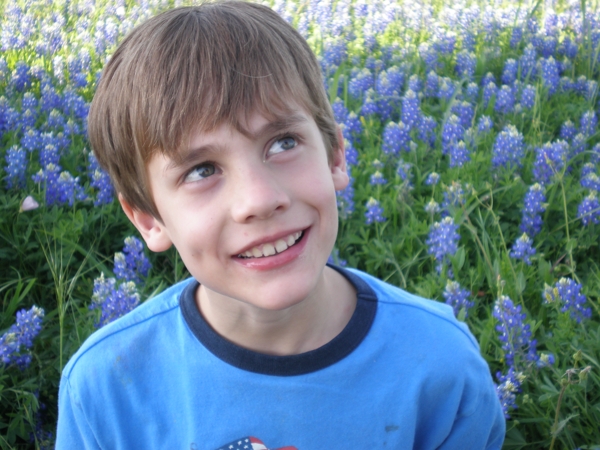Charles
Post below originally posted on Autism Speaks blog 1/11/11.
Guest Blogger Geraldine Bliss is the Chair of the Research Support Committee for the Phelan-McDermid Syndrome Foundation.
Six years ago, my son, Charles, was diagnosed with Phelan-McDermid Syndrome (PMS), a rare genetic condition caused by damage to chromosome 22 (22q13). Charles has a chromosome break in the middle of the SHANK3 gene, which codes for the crucial post-synaptic protein, Shank3, mutations of which cause autism. Charles has a rather small deletion by PMS standards, and he was one of the first patients to be diagnosed with PMS through chromosomal microarray.
Once we learned the diagnosis, our family quickly connected with the Phelan-McDermid Syndrome Foundation (PMSF), where we met, both on-line and in person, other families facing the same challenges. Just as in the larger autism community, some individuals with PMS were “just like Charles,” while others were very different. The foundation members were quick to embrace us and make us feel like extended family. Through PMSF’s biennial conference, regional get-togethers, newsletters, family discussion group, and social networking, our 600+ families are able to stay connected and support each other.
PMSF has grown quickly, but our membership numbers reflect only the very tip of the PMS iceberg. In the U.S. alone, we estimate there are about 8,000 children with PMS. Many of these children have never been tested with a chromosomal microarray (the most common test for PMS), either because their doctors have not referred them or because the cost is not covered by their health plans.
Charles is now 12 years old. Just before his 9th birthday, he started having seizures. As his seizures spiraled out of control, and we began to exhaust one treatment option after another, I promised Charles to do whatever I could to help him get better. I became the chair of the PMSF’s Research Support Committee. Our family crisis, and my new role in the Foundation, occurred at a critical juncture in autism research. There has been growing scientific interest in SHANK3, a gene on chromosome 22 along with several other autism-related genes, which portend a new era of understanding and medical treatment.
While only about 1% of people with autism spectrum disorders (ASD) have SHANK3 mutations, Shank3 research has broad implications for many people with ASD. It plays an important and central role in synaptic structure, learning, and memory in autism. It interacts with many other proteins critical to neurological functioning, and some of these proteins are already implicated in other genetic forms of autism. A number of researchers have developed mouse knockout models that turn off different parts of the Shank3 protein. These models have led to behavioral, chemical and physiological assays to study the underlying molecular problems in ASD and to rapidly test candidate drugs for future clinical studies. Unlocking the mystery of Shank3 will open the door to understanding its partner proteins, providing a research path towards effective drug treatments for many ASDs.
While Shank3 research is very promising, laboratory science by itself will not lead to effective treatments. In January 2010, the PMSF’s Research Support Committee met to develop its first strategic plan for science. As a result, we prioritized several initiatives aimed at promoting all of the steps needed to ensure that research will lead to clinical gains. One of the most exciting initiatives is the Phelan-McDermid Syndrome International Registry. The Registry will collect and catalog information about the developmental, behavioral, and health profiles of individuals with PMS. The Registry will better characterize PMS, inform clinical care guidelines, and facilitate the discovery and development of therapeutics for PMS.
Our Foundation is also organizing the First International Phelan-McDermid Syndrome Symposium, which will be held on March 3 and 4, 2011. Our co-investigator is Joseph Buxbaum, Ph.D., Mt. Sinai School of Medicine. Our goal is to bring together our stakeholders to develop a plan to maximize scientific resources through coordinated efforts and to find the fastest pathways from bench to bedside. The discussions from the symposium will inform PMSF’s funding decisions as we begin to award grants and fellowships.
Charles’ seizures continue to be poorly controlled. He has social, behavioral, and communication challenges that affect every aspect of his life. After all these years, you might think I would have come to terms with all of this, but every day I feel grief. Sometimes I wonder how much more fear and heartache I can take, but Charles inevitably straightens me out! Charles has retained a joy that seems incompatible with the suffering he has endured. Every day his smile and great big dimples tell me he wants to live life and live it joyfully. How could I not pledge myself to accelerating translational PMS research? Now that I am involved, I truly appreciate the role that patient advocates can have in both supporting research and helping to steer its course.
We are now at the beginning of a very exciting time for research related to disorders like PMS and other genetic causes of autism. Advances in science, including the mapping of the human genome, new research tools, and new high-throughput drug discovery paradigms, are reshaping expectations about understanding and treating genetic conditions. Our group’s goal is not just finding medications to treat some of the manifestations of PMS, but having therapeutics that will target the underlying molecular causes. Just a few years ago, I had little reason to expect significant help from medical science, but promising new scientific work on Shank3 is inspiring hope that perhaps we will one day have a cure for PMS and related ASDs.
To learn more about the Phelan-McDermid Syndrome Foundation, please visit: http://www.pmsf.org

